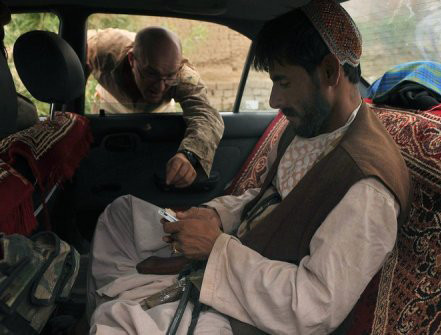By Claire Truscott
MARJAH, Afghanistan — A cornerstone US policy to turn Afghan farmers into armed watchmen to keep out the Taliban has hit controversy and been scaled back over allegations of infighting and illegal taxation.
In Marjah, the 1,150 trained local police or "arbaki" patrol an area transformed from insurgent hotbed into a mostly peaceful farming district in southern Afghanistan since a military operation 15 months ago.

In Marjah, 1,150 trained local police or "arbaki" patrol a mostly peaceful farming district. (Photo: AFP / Massoud Hossaini)
Creating the force has been key to the American military's strategy to reverse a nearly 10-year Taliban insurgency and begin drawing down troops from July with a view to ending its combat mission in 2014.
But President Hamid Karzai has expressed concern that the new groups could feed a fresh generation of warlords, doubts shared by many Kabul-based policy experts and some US commanders.
And initial plans for a 30,000-strong force nationwide have been scaled back, with the scheme already canned in the dangerous nearby district of Sangin.
Trained by US Marines, arbaki are paid $150 to $180 a month, about half the salary of a national policeman, and wear an earth brown uniform with bright yellow star patch to signal their support for the Western-backed government.
Marjah has garnered much attention in Washington, seen as a test of a surge of 30,000 troops ordered into Afghanistan 18 months ago by US President Barack Obama. Six congressional delegations have visited since the start of the year.
In the centre of Marjah, the arbaki or ISCI (interim security for critical infrastructure) receive a polite welcome as they conduct searches of rural compounds suspected of hiding bomb-making material.
But residents in outlying areas still troubled by Taliban attacks claim the local police use their official status to solve petty disputes.
"Some of those who joined the arbaki are using it to settle scores with their family members. They tell the US and ANA (Afghan army) that they are Taliban and should be arrested," said Haji Abdul Rasoul, a Shinghazak resident.
Local farmer Baar Jan, in his 20s, said the arbaki confiscated mobile phones. "And they sometimes demand money," he said.
One group of elders recently complained that their commander was withholding wages and threatened to quit unless an alternative leader was installed.
Recruitment was stopped briefly this year over fears over the quality of the arbaki amid such disputes between local commanders.
Local chief of police, Ghulam Wali, who has worked in Marjah district for 10 months, admits problems persist.
"There is some weakness of discipline but I can solve these issues, I know the tradition and culture of these people," he said, adding that he detained two local police for illegally taxing locals.
"I put them there as an example to the others," he said.
US Marine commanders in Marjah dismiss most allegations of corruption as "enemy propaganda" and cite the benefits of a local force that can distinguish insurgents from thousands of squatters.
Marines stress that all recruits are put through an 18-day programme to learn policing basics, including ethics lessons to deter corruption.
"A lot of people are concerned about the arbaki -- is it a militia? It's not a militia, it's handled by the DCOP (district chief of police)," said Colonel David Furness, the US Marine commander in charge of Marjah.
But across the Helmand river in the district of Sangin, the deadliest spot for US Marines in the war, political pressure from Kabul forced the marines to halt the scheme before it even began.
Fighting during that 1992-1994 conflict killed more than 80,000 civilians, according to UN figures.
Commander of 1st Battalion, 5th Marine Regiment, Lieutenant Colonel Thomas Savage, compared the arbaki scheme to Iraq, where bands of so-called "awakening groups" threatened to start their own war after failing to succeed in elections.
"It's a good way to get whatever short-term problem fixed... but in the long term it's a problem if we create thousands and thousands of ISCI. What will they do in 2014 (when foreign combat forces leave)?"
But officers acknowledge that levels of national police and soldiers in Marjah are stuck at half the designated strength, with high illiteracy rates affecting the number of suitable recruits.
Afghan army commander Major Hanifullah Shinwari says 155 of his 650 soldiers are currently at home or on vacation.
"Maybe some of them don't come back," he admitted. "Two days ago four soldiers ran away. I think they're scared."



